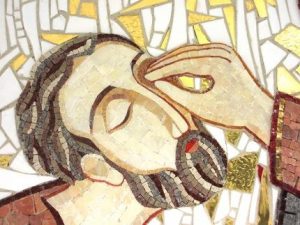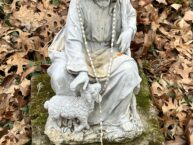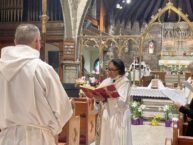 March 22, 2020: May God’s words be spoken, may God’s words be heard. Amen.
March 22, 2020: May God’s words be spoken, may God’s words be heard. Amen.
Lordy, the authors of this fourth gospel sure have a way with words – lots and lots of words. Last week it was the powerful and long theological dialog between Jesus and the woman from Samaria. Next week it will be the equally long passage about the raising of Lazarus, so if you are standing as we do for the gospel, wear comfy shoes. Today, it is the narrative about a blind man healed by Jesus, and what a story for our time in these days of the pandemic.
But first, a bit about some things you may have noticed if you were listening while following along in the bulletin – which, btw, is available for download off our website if you are just joining us.
First, if you’ve been worshiping with us for some time, you are used to this sort of thing, but for the rest of you, it may have seemed odd that every time the authors wrote “the Jews,” I substituted something like “the temple authorities,” or “the people.” Here’s the thing…this gospel, likely written near the end of the first century, while filled with some of the most beautifully written verses of our scriptures, also contains references to the Jewish people that seem to set Jesus and his followers as separate from them, and through the centuries has led to anti-Semitic acts. Which, if anyone really thinks about it, is absurd, because who is Jewish in this story – well in all of the bible? Nearly everyone. – Jesus, all his followers, St. Paul, who wrote a lot of those epistles, and yes, even some who stood opposed to his ministry – all Jewish. God became incarnate as a Jew, chose Jewish followers, and preached in the synagogue, So, to make that more clear, I change the language.
The second thing, well, we’ll get to that in a bit.
So, let’s get to that story, and why it has meaning for us today. Jesus is walking along with his disciples when he sees a blind man. Now, this is one of those odd moments when even a man is not given a name – he’s just “the blind man.” That happens a lot to women in the bible, but not usually to men. But we quickly see why here.
Like women, who were sometimes thought of as little more than objects in that time, so why bother to give them the dignity of a name, so too this man with his blindness – for he is the object of his disability. In fact, when he is given his sight, many didn’t even recognize him. His entire identity for them was wrapped up in his difference. Sadly, this isn’t something restricted to the first century writers of this gospel – today it would be the black man, the gay woman, the trans teen, the republican, the democrat, the Muslim, the Jew, the Christian, the woman in the wheelchair, the autistic kid, and yes, the blind man. We love our labels to distinguish those who differ from us, our mass groupings of people into a single labeled entity. But Jesus calls us to see in a new way – in the way that he saw him.
So, let’s do that, and as I am wont to do, let’s at least give the guy a name. Let’s call him Fred. Now back to the story – Jesus sees Fred, and before he can even begin to heal him, his disciples want to know who is to blame for Fred’s blindness. Now, maybe it is hard to imagine how anyone might react to a medical situation by blaming someone for it (or perhaps maybe not), but in the Ancient Near East context in which our scriptures were written, that was not uncommon.
Sadly, right now in the world, especially here in our own country, many folks act like the disciples and later the Pharisees in this gospel – they want to blame somebody for what they do not understand, or what frightens them. In the case of the coronavirus pandemic in which we find ourselves – it may manifest not as blaming someone’s parents, but labeling it the Chinese virus – let’s blame them – resulting in attacks on those of Asian descent. Or it may be heard in the online demands for names of people who are infected – and not in a “gee, I would like to pray for them” way. This doesn’t even touch on the hoarding that robbed medical professionals and those who are vulnerable from needed personal protection devices and anti-bacterial sanitizers because we were just too afraid and acted selfishly – but it comes from the same inner darkness – the inability to see beyond ourselves or those like us.
We fear what we do not yet understand, and fear, born of the darkness of our heart, breathes more of it into the world – the darkness of hate, violence, bigotry, oppression, and greed. This is part of the lesson we are hearing today, only we have sometimes missed it through the centuries because of a scriptural addition that sent us down the proverbial rabbit hole of some bad theology.
Remember that the disciples asked Jesus who sinned that this man was born blind, and Jesus answers them. Well, guess what. Here is where the translation gets off track, and where you may have noticed that other change from the gospel when it was read vs. what is printed in your bibles or the bulletin. In the text, Jesus responds to their question with “Neither this man nor his parents sinned; he was born blind so that God’s works might be revealed in him.”
Now, I am loathe to do any “the original Greek says” stuff, but sometimes it is critical, and this is one of those times, because that bit about Jesus saying “he was born blind” isn’t there – it is not in the earliest Greek of this gospel. What Jesus said is better translated as, “Neither this man sinned, nor his parents: but that the works of God should be made manifest in him.” So, nothing there about God making him blind from birth to show us something – that would just be messed up. Yet through the centuries, this addition in the translation – that God made this man blind as some sort of lesson for us all – has been used in some ways that, while meant to be healing, are just not.
Bad theology needs to be called out, and this is one of those that must be addressed every time it happens – God doesn’t do stuff to us to mess with us, and certainly does not purposely cause pain and suffering as some sort of trial, test, or lesson for the world.
As or Presiding Bishop, the Most Rev. Michael Bruce Curry, often reminds us, “If it’s not about love, it’s not about God!”
So where is God in it all?
From the moment we are born, part of our very human and fragile existence is that good things and bad things will happen. Yet God is rejoicing with us in the good times, and weeping with us in our despair. God is an ever present part of our journey. Like a loving parent, hoping for all good things, and there for us when we stumble or are in pain.
From the beginning of time, God has sought to be in the fullness of relationship with us – God’s beloved children – a relationship of love – even becoming incarnate – that we may know this love – that we might know that we are not alone.
That we may truly know that God is with us.
God loves us.
God will never abandon us.
And that is a powerful message for us all today. Because in our darkest moments, such as many are feeling today, it is important to be reminded that light shines brightest in the deepest of the night – when we cannot see our way through – when we are unable to see the goodness in the world around us – when we are blind to what will heal us. It is then when we must remember that Jesus saw this man living on the margins, healed him, and when others still would not accept him, went to him – bringing him out of isolation and into relationship.
That is how much God loves us – how much God yearns for relationship with us – searching for us in our isolation that we may know we are not alone. Oh, what a message for us today as our social distancing is pushing so many into social isolation.
But there’s more…
Jesus, after trying to tell his disciples that neither Fred’s parents or Fred sinned, also made it clear that in Fred, God may be revealed. And that, my friends, is another reason this passage has so much to say to us today, because the truth is, every single one of you are Fred, you are the blind man, and does God ever need you to know it.
Now, you may not be physically blind, (though some of you listening in today may be), but we do all have our own challenges – physical, emotional, spiritual, and temporal – none of which were caused by God, but through all of it God’s light can be revealed.
And in this time of social distancing, where we fear for ourselves and our loved ones, when we are pushed from the sacred spaces which often brought us comfort in our past, God needs us to hear this good news more than ever before. Because it is in times like these where we can feel most in the dark – most isolated – most blind – that we must remember God will always come looking for us, love us unconditionally, and through us reveal that grace to others.
That’s where it is hard for us, isn’t it…when we are feeling most broken, most in the dark, that we might actually be the healing light of God’s love to others. This is especially true as we are pushed from the comfort of our spiritual homes – our churches, synagogues, mosques, and temples – for those are the places that bring us nourishment and spiritual healing.
And yet, we know that our lives in Christ are not bound up within this place, but are sealed in our hearts at baptism. That the Jesus who searched for Fred, our blind man pushed to the margins, is always keeping watch over us too – no matter where we are. And perhaps most important of all, that as children of God, as a people of the Jesus Movement, we are called to respond to that love by offering it to others – revealing God’s grace to a world in need beyond these walls.
God is calling us to be who we were born to be, the children of light as our epistle said. But how?
Well, just look around you! Look for the Christ that is present everywhere – those moments when you encounter Him in small acts of love, grace, and courage.
If we were paying attention, we saw him this week in a little table stand someone set out at the end of their driveway – on it were rolls of toilet paper, bottles of hand sanitizer, cans of soup, and more. A hand-written sign said “Take whatever you need.”
We saw him in the young woman who told an elderly couple to stay in their car in the grocery store parking lot, going into the store for them and buying their groceries, that they who are most vulnerable would not be exposed to the virus.
We see him even now in the health care professionals, many risking their lives without proper protective gear, and working tirelessly to tend to the sick, that they not be cast aside and left without help.
Or in the teachers laboring to keep students and parents up to date, the grocery store clerks working overtime to re-stock shelves, the restaurants offering up leftover food and curb-side pick-up, those who sew making surgical masks, or a neighborhood in Maryland joining together to leave outdoor lights on “spread cheer in the darkness” – and so many more.
We see and experience Christ, the one who heals, the one who seeks us out, the one who brings us into relationship – we see Him in all of these, as we also see him here today.
We are in the midst of Lent, when we prepare ourselves for the darkest night of all – at the foot of the cross. Yet as followers of Jesus, we know that the light of Christ was not extinguished on that cross, but is present here – now – in each of us. We know too that the hope of God was not lost on Good Friday, but exists within each of us who reach out to those in need, care for the sick, and hold the grieving in our arms.
We are a people of the light, called to see those who walk in darkness – for that is how we, the broken, become a reflection of God’s all inclusive love – by seeing the ones Jesus would see – the sick, the lonely, the outcast, the fearful, the oppressed – seeing Him in their eyes – and being witnesses of his grace and all abiding love in our words and in our lives.
Jesus wasn’t speaking only about Fred our blind man here – he was saying to his disciples – to all who follow him… to every one of you…
You were born that God might be revealed in you!
Listen to that again –
You were born that God might be revealed in you!
You were born that God might be revealed in you!
What will YOU do with that truth?
In this time of pandemic and separation, may our eyes be opened to the Christ who seeks us out, the Christ who heals us, the Christ within us, the Christ who is revealed in others, that we may be who we were born to be – a reflection of God’s all inclusive love to a world in need.
Amen.
For the audio from the 10:30am service, click below, or subscribe to our iTunes Sermon Podcast by clicking here:
The Rev. Diana L. Wilcox
Christ Church in Bloomfield & Glen Ridge
March 22, 2020
Lent 4
1st Reading – 1 Samuel 16:1-13
Psalm 23
2nd Reading – Ephesians 5:8-14
Gospel – John 9:1-41






